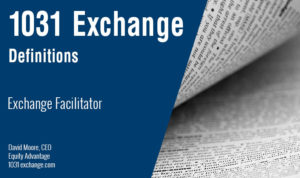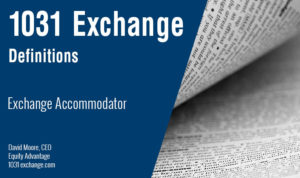
We are taking a look at how to liquidate a partnership to move forward in an 1031 Exchange, the latest 1031 Exchange info via our latest webinar video, and out-of-state replacement properties.
To learn even more about the different investment directions that you can take, check out the Equity Advantage Video Library and subscribe to the Equity Advantage YouTube channel for more 1031 Exchange educational videos.
Steps to Effectively Liquidate a Partnership
In today’s 1031 world partnerships and “continuity of vesting” are second only to time as the biggest headache for exchangors. Partnership issues can arise from partners or a partner wishing to Exchange out of a property separately from his or her property, or simply from finance requirements. Partnership interests are specifically prohibited from 1031 treatment. The “Partnership” can do a 1031 but the members cannot.
If a partnership can be liquidated, it is important that it is liquidated in fact and the resulting tenancy in common (TIC) arrangement be respected.
Steps that should be taken to effectively liquidate a partnership:Read More About Partnerships and 1031 Exchanges»
The State of 1031 Exchange in 2022 – It’s All Time and Money
This 1-hour webinar covers everything from when to get your money and identification rules to passive investment options and 2022 endgames for the 1031 Exchange.
To stay up to date, subscribe to our channel!

Can I take advantage of a 1031 Exchange if I want to acquire a replacement property in a different state than the relinquished property is located?
Exchanging property across state borders is a very common thing for investors to do. In fact, a great number of our clients do exactly that. It is important to recognize that the tax treatment of interstate Exchanges vary with each state and it is important to review the tax policy for the states in question as part of the decision-making process.
More Answers to Your Questions »
The Guys With All The Answers…
 David and Thomas Moore, the co-founders of Equity Advantage & IRA Advantage
David and Thomas Moore, the co-founders of Equity Advantage & IRA Advantage
Whether working through a 1031 Exchange with Equity Advantage, acquiring real estate with an IRA through IRA Advantage or listing investment property through our Post 1031 property listing site, we are here to help Investors get where they want to be. Call them today! 503-635-1031.









